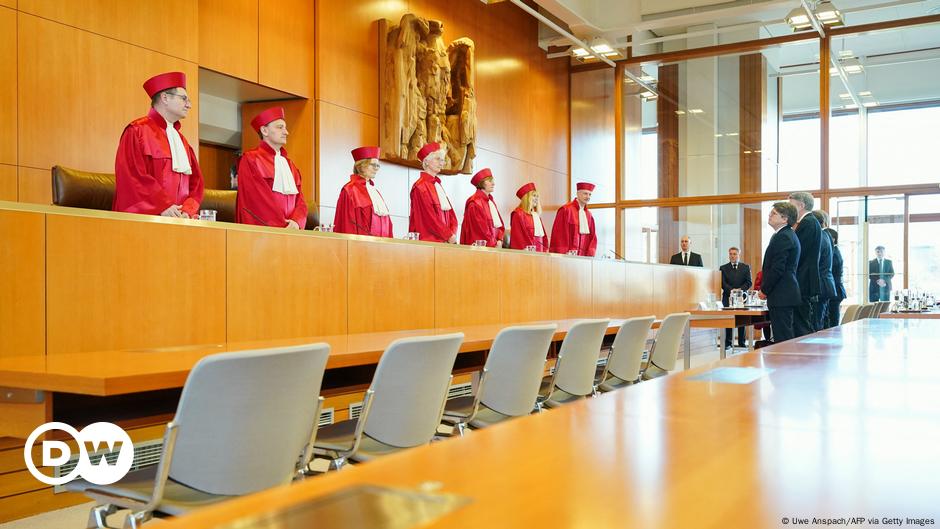The German parliament, the Bundestag, voted on Thursday to strengthen the Federal Constitutional Court to protect it from political influence, partly as a safeguard against the growing strength of the Alternative for Germany (AfD).
The amendment to the law regulating the Constitutional Court submitted to the German parliament this week was one of the last acts Chancellor Olaf Scholz’s broken coalition government was able to agree on before February’s election. The amendment passed Friday with the required two-thirds majority in the Bundesrat, the chamber representing Germany’s 16 state governments.
Drafted under the supervision of former Justice Minister Marco Buschmann of the Free Democrats (FDP) with the help of the Social Democrats, the Greens and the opposition conservative bloc of the Christian Democratic Union (CDU) and the Christian Social Union (CSU), it is enshrined as constitutional in the German Constitution. The structural features of the Court, the Basic Law, make them difficult to change.
The proposed law will fix the number of judges (16), the tenure of judges (12 years), and their maximum age (68). It would also establish the structure of the court: two senates of eight judges each, divided into chambers.
To help guarantee that the Court’s ability to function cannot be jeopardized, the Basic Law will also provide that a judge will continue to perform his or her duties until a successor is elected. . The law also protects the autonomy of the court’s internal procedures – meaning, among other things, only the judges can decide in what order they will hear cases.
Furthermore, the amendment ensures that “obstructing minorities” in either of the two parliamentary chambers – the Bundestag and the Bundesrat – cannot hinder the appointment of judges. For example, if a two-thirds majority cannot be mustered in the Bundestag, the Bundesrat will have the power to appoint judges.
Social Democrat Interior Minister Nancy Feser said the law was being introduced to ensure that “the enemies of our democracy do not have a gateway to the judicial system”.
“When we look at foreign countries, we see that when autocratic people come to power, they almost always turn against the efficacy and independence of the judiciary,” he said in Thursday’s debate. “They respect the rule of law and constitutional courts are often their first target.”
The law was passed with votes from the SPD, the Greens, the CDU/CSU, the FDP and the Socialist Left Party. Fabian Jacobi of the AfD protested, arguing that it was being imposed by “self-appointed elite democrats”. He accused other parties of refusing to allow the AfD, saying, “What you are projecting here is an image of the Constitutional Court as an instrument of power of the party cartel that you are unwilling to let go of.” ” Hand in the appointment of judges to the Supreme Court.
Sections of the far-right AfD have been considered a threat to the constitutional order by intelligence agencies. Fears increased in September, when party members threatened to use party power in the Thuringia state parliament to prevent the election of a new parliamentary speaker.
Poland’s judicial reform crisis spurs action
Lawmakers appear to be focused on recent controversies and the AfD’s success in EU member states Poland and Hungary, which currently poll around 18% nationwide.
Ulrich Karpenstein, vice president of the German Bar Association and one of the country’s leading experts in public law, believes such changes are important. “The Constitutional Court is not immune to obstructions from the parliamentary minority, especially when it comes to the selection of judges,” he told DW earlier this year. “Nor is it safe from a simple majority in the Bundestag, such as the scenario created by the PiS party in Poland.”
“One could do so-called ‘court-packing’ – in other words, simply appoint additional judges or create additional chambers with one’s own judges,” he said. “There are a number of ways to improve this, and really the consensus is that something needs to be done.”
But Stefan Martini, senior researcher in public law at Kiel University, believes that, although the reforms may seem quite reasonable, lawmakers need to exercise some caution. “I would be very careful,” he told DW in February. “It certainly makes sense to write some rules about the Constitutional Court into the Basic Law, but I would limit it to very basic rules.”
Martini believes rules limiting the tenure of judges and banning them from being reelected are appropriate, but said he has “mixed feelings” about forcing a two-thirds majority to select judges. “Was. “Because if you do that, you’re going to have to figure out how you’re going to deal with parliamentary obstruction,” he said. “And there is no perfect solution to this – whether it’s another branch of government taking responsibility, or a panel of judges, and that would lead to less democratic legitimacy.”
The recent judicial reform crisis in Poland prompted many lawyers in Germany to look for ways to protect the German Constitutional Court. The crisis, which sparked mass protests, began in 2015 when the Polish Law and Justice Party (PiS) was accused of evacuating the court. After assuming power. Claiming an absolute majority in the Polish parliament, the nationalist conservative party amended the laws governing the Constitutional Tribunal and appointed five new judges to the court.
In 2019, the PiS government also created a new chamber of the Supreme Court, called the Disciplinary Chamber, and changed the law to allow the government to appoint and dismiss the head of the Supreme Court, which ruled in 2019. Ruling that they violated EU law and undermined the independence of the judiciary.
Making laws harder to change isn’t always a good thing, analysts warn
Similar crises have emerged elsewhere – reforms carried out by the nationalist Fidesz party in Hungary in 2013 were criticized internationally for weakening the separation of powers between the legislature and the judiciary.
Karpenstein said, “The Constitutional Court is central to democracy and the rule of law, to the protection of fundamental rights, the separation of powers, and free elections.” “Imagine the scenario we would have had at the end of a legislative period [US President Donald] trump or [Brazilian President Jair] Bolsonaro – In other words, a president who doesn’t want to leave office saying the election was fraudulent. At a moment like this, we need a court that can decide whether such claims are true or not.”
But Martini warned that making laws difficult to change is not always a good thing. “For example, once an intolerant government is voted in, and a progressive government is voted in, they will also need to secure a majority to roll back policies.” He said. “And if you include certain rules in the Constitution it becomes even more difficult.”
Karpenstein welcomed the new reform. “The discussions between CDU and coalition representatives have yielded important and intelligent proposals that emphasize the independence of the court and protect its judges from political interference,” he said.
He said the proposals effectively rejected court-packing and other constitutional threats, but he suggested that in the future, the Constitutional Court could be strengthened even further if the Bundesrat was given more discretion regarding new judges and other rules. Was included in the decisions taken.
“It is important that future changes to the Federal Constitutional Court Act, and in particular the quorum for the election of judges and decisions by the Federal Constitutional Court, can no longer be amended by a simple majority of the Bundestag,” Karpenstein said.
This article was first published in February 2024 and was updated on July 23, 2024, October 11, 2024, and December 20, 2024 to reflect the reform’s progress through the legislature.
Edited by: Reena Goldenberg
While you’re here: Every Tuesday, DW editors provide insight into what’s happening in German politics and society. You can sign up for the weekly email newsletter Berlin Briefing here.






Leave a Reply